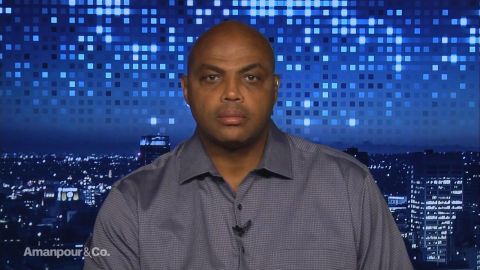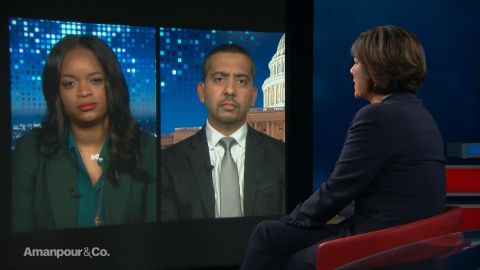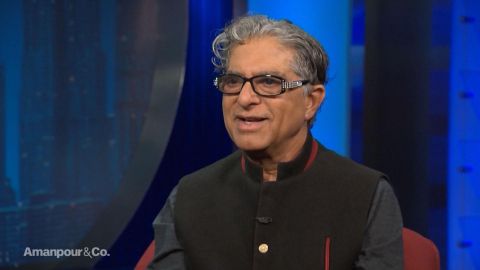Read Transcript EXPAND
CHRISTIANE AMANPOUR: And now for our next guest, he has become a household name in the field of alternative medicine and Oprah is among his meditation followers. Deepak Chopra is also a bestselling author and a new age wellness guru. He has just released his 89th book. It’s called “Metahuman” in which he unfolds a path to higher consciousness and our Hari Streenivassan sat down with him to find out why unleashing your full potential is important to every aspect of your life.
(BEGIN VIDEO TAPE)
HARI SREENIVASAN: The name of the book, “Metahuman.”
DEEPAK CHOPRA, AUTHOR: You’re right.
SREENIVASAN: What does it mean?
CHOPRA: So the word “meta” means beyond and in this case human means the condition socially constructed human mind. What is reality before social constructs or interpretation of experience? When you have children, a child is born it has no identity. You know it doesn’t have a name, no nationality, no economic status.
SREENIVASAN: It doesn’t know its gender. It doesn’t know its race, right?
CHOPRA: No history. No gender. No nationality. And then the process of social construction and identity begins and you then assume that’s your identity but that’s a provision of identity. The name, the social construct, even the body because your body is not a noun, it’s a verb. It’s a process and so you start fertilize a woman then you’re a zygote and then an embryo and then a baby and then a toddler and then a teenager and now this and an old person and then gone. So what is it behind all this social constructs and the conditioned mind?
SREENIVASAN: So if all of this is not real or if that’s not the reality. I mean you’re almost describing – it’s like “The Matrix” that would.
DR. DEEPAK CHOPRA: It is the matrix, but .
(LAUGHTER)
DR. CHOPRA: . but people have said this before. OK. We can .
SREENIVASAN: In the veil of my .
(OVERTALK)
CHOPRA: Yes, the veil (inaudible) we can shine the German philoso [ph]. We are asleep, life is a dream but once in awhile we wake up enough to know that we are dreaming. So right now we’re having this conversation, if I asked you what happened to your childhood, you’d say it’s gone. But what happened to you yesterday, it’s gone. What happened to five minutes ago, it’s gone. What happens to these words by the time you hear them they don’t exist. We are looking at the past, even perceptionally we are looking at the past. All the time. But the reality is infinite possibilities before we construct it. We literally construct our experience of what we call everyday reality. Our conscious conceives, governs, constructs becomes that which we call the physical world. Including that which we interpret as the physical body. Because it’s a process, it’s – it’s an activity and that activity, perceptual activity whether seeing or hearing or tasting or smelling or sensing in any way.
SREENIVASAN: Yes.
CHOPRA: That’s in consciousness alone. So we, as humans, are a particular species that has unique modes of knowing, unique modes of perception, unique modes of ex – of experience that we interpret as mind, body, universe. Now that’s very convenient to have these constructs. Granted main time, why not Botswana main time, right. Money, Wall Street, political systems, colonial empires, nation states. These are all social constructs.
SREENIVASAN: But they’re still important. I mean these social .
CHOPRA: Very important in navigating experience, but .
SREENIVASAN: Yes.
CHOPRA: . interfere with our creativity. So when you — when you today when you talk about technology, when you say disruptive technologies, which means somebody, somewhere an artist or a scientist broke through the conditioned mind. Otherwise 99 percent of our, even our language, is just recycling old concepts.
SREENIVASAN: So, someone’s listening to this and saying you know what this is perhaps the sort of luxury of being much further up in the masos hierarchy of need. You’re talking about self actualization. How does somebody who’s struggling with the basic of shelter and food and water, what value do they get with such introspection, with coming to a conclusion or reality that well perhaps my perceptions are dominating this. I don’t know, what am I going to get if I transcend into metahuman?
CHOPRA: There are two schools of thought on that. One is you can not actually talk about self actualization or self transcendence to a person who’s struggling with survival.
SREENIVASAN: Right.
CHOPRA: Or safety. And there is a hierarchy, survival, safety, love, belongingness, achievement, self esteem, creative expression, our conscious self actualization. So don’t even talk about this. But there’s another school of thought and this part of actually very much every religious and cultural tradition. In Christianity they say seek first the kingdom of heaven everything else will come spontaneously. And the kingdom of heaven is this higher seat of consciousness. And if we don’t, as they say seek the highest first, the highest knowledge. So you start from somebody transcendence and then you, it’s a top down approach.
SREENIVASAN: Right.
CHOPRA: The other’s a bottom up approach. And what I found is that actually if you live a creative life and if your life is centered around, what we call platonic values, truth, goodness, beauty, harmony, love, compassion, joy, equanimity, that’s a natural outcome of getting in touch with yourself. And then as a result of that natural outcome there’s also a new kind of creative expression. So I can’t answer your question, where should one start. It depends on the person and where they are in their stage of evolution.
SREENIVASAN: And when you look out at the world today, it seems that we are increasingly in a for selfie culture. Right in the sense that I will, there’ll probably be a social media post with a photo of the two of us. But it – it’s like there’s a world of presentation, representation, misrepresentation it’s constantly running around us. How do you get off that cycle?
CHOPRA: Well if you don’t off that cycle, Hari, I think we’re risking our extinction. We’ve come the edge of the precipice right now and it could be any one of a number of factors. It could be a nuclear accident, it could be biological warfare. We have technology right now to get rid of human civilization 20 times over. And it’s not just the U.S. everyone from Pakistan to India to Iran to North Korea to Russia, China everybody has these ambitions of being the dominant power. It’s almost like we are in the midst of a collective insanity right now. And it’s driven by narcissism, it’s driven by greed, it’s by selfishness, driven by power mongering, influenced peddling, cronyism, corruption, buying over your enemies to support you and your personal motivations. If this not insanity then we are declaring our own insanity. And we need to face this right now. If we don’t we’ll be the seventh extinction, you know. The universe will continue but humans will have been a failed experiment (LAUGHTER) in evolution.
SREENIVASAN: What do you think explains the political divide today? Is this a reflection of divides that are in us? Is it us electing the leaders that reflect that?
CHOPRA: Our leaders, doesn’t matter who they are, democratically elected, autocrats, monarchs, they are symbolic expressions of our collective consciousness. If you don’t like your leader then you can’t actually blame the leader, we have elected these leaders. Sometimes legally, sometimes illegally. But still the very fact that they’re there, they are representing symbolically our conditioned mind. At this moment what I see is kind of a reaction to transformation. America for example is changing and the demographic is changing as a result of that there’s a lot of fear England has been inundated by immigrants, the natives, if I may call them that, are reacting with fear. It’s like in a way it’s a – it’s a reaction to colonialism, the fear. And so the point is, what’s the creative solution? And the creative solution is ultimately on discerning that regionalism, isolationalism, and extreme nationalism and any of its expressions, whether it’s as a result of racism or bigotry or hatred or prejudice, this is going to doom us. Because the world totally inter [ph] dependent right now. You fight with the Chinese and the Chinese will screw you too. You – you right now if we do not understand that the global economic and political systems are so entangled and so intertwined that the best solution to our problems today has to be a global solution. It can not be extreme nationalism coming out of fear.
SREENIVASAN: Perhaps indelicate questions, but, look people are going watch and say how do you reconcile your success, your wealth and you preach humility, you sort of preach a detachment from material stuff. But you’ve succeeded. You are able to have the luxury of time. You have homes that are millions of dollars. That’s great for this guy, but how does this all translate to me, right?
CHOPRA: So you know when I came to this country in 1970, as an intern after medical school, I couldn’t leave India with more than $8 foreign exchange regulations. I had an uncle in London who lent me $100 so I had $108 Indian mythology, that’s .
SREENIVASAN: Auspicious number:
CHOPRA: Auspicious number, so I thought I’d do something auspicious with it. I went to Paris and I spent it all in one night at the Moulin Rouge. So when I came to the United States I had zero. I had to make a collect call to my hospital to pick me up from JFK because I didn’t have money for a taxi cab or there was no Uber or even for a bus ride.
SREENIVASAN: Right.
CHOPRA: So I started with nothing and are you asking me to apologize for my success, the American dream? I did — I just followed my passion. That’s all I did. I trained in internal medicine. I struggled as a resident and doctor to the point that stress was driving me crazy – smoking cigarettes, getting drunk on weekends and taking care of patients. Very stressful life with patients in the ICU, 30 patients in the office, answering to relatives every moment, consoling peole whose child had died or a parent had died and I realized I wasn’t helping them because I wasn’t even helping myself so there was a transformation and so from endocrinology to neuroscience to mind, body medicine, integrated medicine, now metahuman, this was a journey of evolution that I didn’t plan and I didn’t even plan my success actually an now I’m at a stage where I’m in the process of slowly dismantling all of that. My whole focus now is on nonprofit, on creating an academic understanding of what we call fundamental reality or consciousness or the hard problem of consciousness of actually helping give birth to many people, to a whole new paradigm in medicine and healing and creativity and problem solving. So that’s my major occupation at the time with my foundation which is a 501C3. I have slowly given up my business to other people to run and I have the luxury now of course of contemplative self inquiry but it wasn’t like this throughout my life. It was a gradual evolution to where I am today.
SREENIVASAN: So what do you say to those people who are still in that place that you were in. they are struggling whether it’s the smoking or whether it’s the stress. They might not be doctors. Right? Especially in the United States there are people who feel politically forgotten, they feel culturally left behind. They feel threatened to their way of life, all of that adds to this anxiety, whether these are social constructs or not.
CHOPRA: There are enough reasons in today’s ecosystem of relationships and politics and society, enough reason to feel victimized.
SREENIVASAN: Sure. So where do you start?
CHOPRA: Well first of all if you really want to create a better life for yourself, then you have to stop being a victim, otherwise you’re reacting and becoming a prisoner of the past. So having gone through this hourney myself, I would say to anyone struggling, get good sleep. Learn to manage your stress. Get exercise. Watch your diet. Make sure you have friends and family and the social support system and once in a while get in touch with yourself and be in nature. If you can start this journey just even by simply asking yourself a few fundamental questions, who am I? What do I want? What’s my purpose? What am I grateful for? You start living these questions. In my case living the questions moved me into the answers. It wasn’t even like I was planning anything. I was not driven by driving ambition, exacting plans, hard work or even a planned journey in my life. It just happened.
SREENIVASAN: This isn’t the Deepak Chopra of maybe 15 years ago who was trying to help you improve your golf game with feel good self help books. Is it something where – is there an impatience, is there an urgency now that you feel in trying to get people to understand this?
CHOPRA: I’m 73 years old. I’m at peace with what I’ve gone through with my life. I’m totally at peace. I have no grievances, no resentments. At this moment, no resistance even to what is and no anticipation and no regrets but I do feel that we have a responsibility to our children and to our grandchildren because if we continue the way we are continuing then they don’t have a future.
SREENIVASAN: Deepak Chopra, thanks so much for doing this.
CHOPRA: Thanks for doing this Hari. Thank you very much for having me.
About This Episode EXPAND
Charles Barkley joins Christiane Amanpour to discuss Daryl Morey, LeBron James and the NBA-China controversy. Brittany Packnett Cunningham and Mehdi Hassan offer their analysis of the October Democratic debate. Deepak Chopra sits down with Hari Sreenivasan to discuss the state of the world and his new book “Metahuman: Unleashing Your Infinite Potential.”
LEARN MORE


